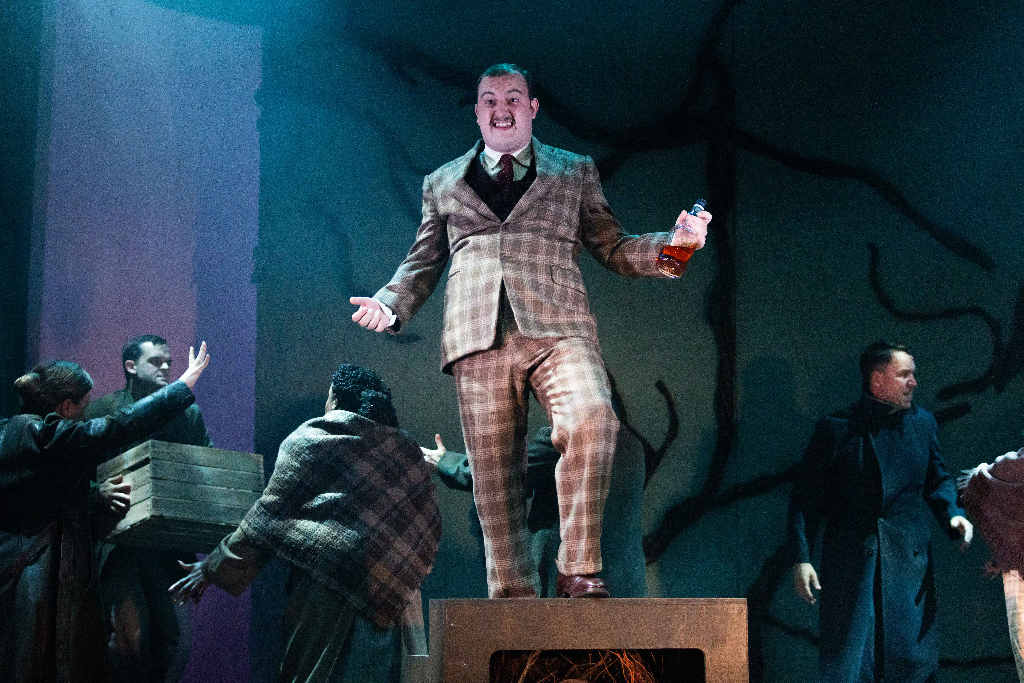There are times when it’s best to know as little as possible before taking one’s seat for a show – this new production of Rebecca would be a perfect such example.
It was once talked up as the new Phantom, the next smash hit musical that would do on Broadway in the 2010s what it had done in Europe in the 2000s. Mysterious backers sent emails from dubious addresses, one bearing news of the death of a key investor and, while real sets were built and real actors rehearsed, the money, like the deceased investor, was never real at all.  More than a decade on, Rebecca, adapted from the 2006 German-language Austrian production by Christopher Hampton, arrives at the Charing Cross Theatre with most of its audience unaware that it was once a very different show: a spectacle to rival any of the warhorses rumbling on in the West End. They might not know that illness in the cast has seen Emily Apps step into a lead role following co-star Lauren Jones’ indisposition, and some might not even know the Academy Award winning Alfred Hitchcock movie nor the celebrated 1938 Daphne du Maurier novel on which this was based. So, what will they get?
More than a decade on, Rebecca, adapted from the 2006 German-language Austrian production by Christopher Hampton, arrives at the Charing Cross Theatre with most of its audience unaware that it was once a very different show: a spectacle to rival any of the warhorses rumbling on in the West End. They might not know that illness in the cast has seen Emily Apps step into a lead role following co-star Lauren Jones’ indisposition, and some might not even know the Academy Award winning Alfred Hitchcock movie nor the celebrated 1938 Daphne du Maurier novel on which this was based. So, what will they get?
Actually, a pretty good show, one with flaws of course – such is the fate of all but a vanishingly small percentage of musicals – but an evening that engages, intrigues and satisfies, if one without quite as much “OMG!”, or should I say, “Ach du lieber Gott!”, as it once had in Vienna.
We open on an unnamed woman, little more than a girl really, but Apps has us all onside with her sweet voice, singing “Last Night I Dreamt Of Manderley” with an underlying fragility. We know that this kid is going to be in danger, but we suspect that she has the depth of character to pull through.
Cut to Monte Carlo in 1927, all art deco wallpaper and supercilious waiters, and our heroine is a near useless companion for a caricatured New York woman of a certain age, a doormat for her ego. Somehow she catches the eye of the handsome, wealthy, quick-tempered widower, Maxim de Winter (Richard Carson, capturing Hugh Grant c.1990) and, in a first indication that Michael Kunze’s book has issues with pacing, they’re married in no time.
When the couple arrive at the ancestral pile, Manderley, the servants clock this new wife as an ingenue and, in a fine ensemble number, “The Brand New Mrs de Winter”, resolve to treat her like a Year 8 class would treat a supply teacher. But the housekeeper, Mrs Danvers, carries a malevolence of a wholly different order, her devotion to the first Mrs de Winter, the eponymous Rebecca, rooted somewhere between unrequited love and psychotic obsession.
Kara Lane navigates this iconic role with a crucial sure-footedness – one raised eyebrow out of place, one smirk too many, one glance beyond the fourth wall, and she’d be straight into Frank N Furter territory. Lane delivers vocally with the show’s standout number “Rebecca” and the unhinged parody of an “I want” song, “Invincible”, but also displays the acting chops to create a villain worthy of the source material’s heritage. Her showdown with the newly emboldened mistress of the house, “Mrs de Winter Is Me”, makes for a splendid set piece, though I do wish they can find some shoes that fully reverse the height differential between the women.
If Carson is, probably under Alejandro Bonatto’s direction, necessarily a little wooden as the damaged de Winter, Alex James-Ward (pictured above) gives it the full ham as the boozy blackmailer, Jack Favell. He has a lot of fun with a stock character that one doesn’t see much these days, and his suit is magnificent in its unabashed spivvishness. But his ruse is defused rather too quickly, especially in a show that runs two and a half hours and has room for 22 songs, many reprised.
The score by Sylvester Levay is played by an 18-piece orchestra under the baton of Robert Scott. It’s more reminiscent of Lloyd Webber than Sondheim in that it seldom surprises, but it also seldom gets in the way of the story either and is consistently pleasing if unlikely to enter any "Great Austrian Songbook" any time soon. There's even an “I Do Like To Be Beside The Seaside” – a very unlikely sentiment for this story – thrown in to lend a Gilbert and Sullivan vibe.
The show gets a lot of musical theatre’s component parts right and, with a compelling narrative from a classic novel to underpin it, one struggles to figure out quite why it’s not more of a success.
Ultimately, I suggest, this version is just not large enough in its execution for the ambition of the piece. The Manderley we see is not as aristocratically grand as it should be, the video projected Cornish sea not as threatening, the climax not as cataclysmic.
There’s a bigger show itching to burst out from this one, so, when you do discover its backstory as that much bigger show, it’s no surprise. But perhaps one revelation, the true nature of Rebecca, is enough for one night.















Add comment